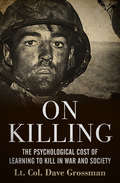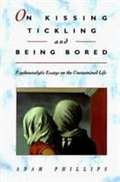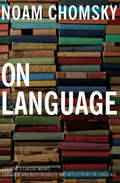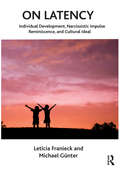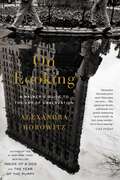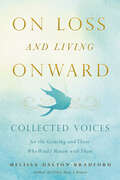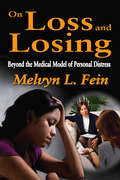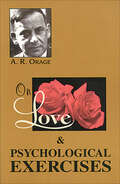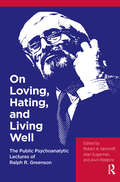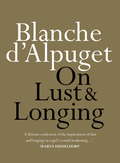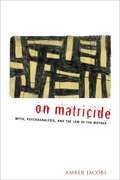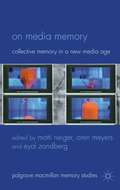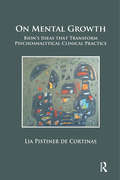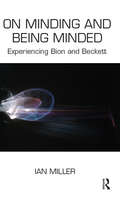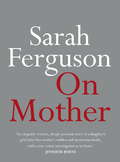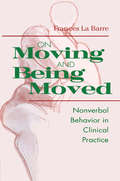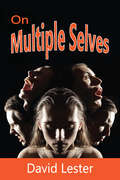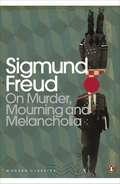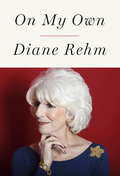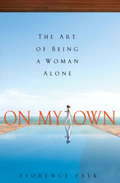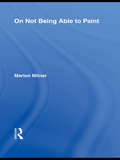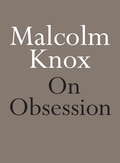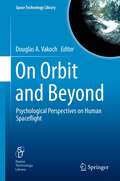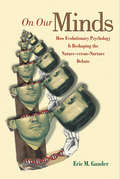- Table View
- List View
On Killing: The Psychological Cost of Learning to Kill in War and Society
by Lt. Col. Dave GrossmanA controversial psychological examination of how soldiers&’ willingness to kill has been encouraged and exploited to the detriment of contemporary civilian society. Psychologist and US Army Ranger Dave Grossman writes that the vast majority of soldiers are loath to pull the trigger in battle. Unfortunately, modern armies, using Pavlovian and operant conditioning, have developed sophisticated ways of overcoming this instinctive aversion. The mental cost for members of the military, as witnessed by the increase in post-traumatic stress, is devastating. The sociological cost for the rest of us is even worse: Contemporary civilian society, particularly the media, replicates the army&’s conditioning techniques and, Grossman argues, is responsible for the rising rate of murder and violence, especially among the young. Drawing from interviews, personal accounts, and academic studies, On Killing is an important look at the techniques the military uses to overcome the powerful reluctance to kill, of how killing affects the soldier, and of the societal implications of escalating violence.
On Kissing, Tickling, and Being Bored: Psychoanalytic Essays on the Unexamined Life
by Adam PhillipsIn a style that is writerly and audacious, Adam Phillips takes up a variety of seemingly ordinary subjects underinvestigated by psychoanalysis--kissing, worrying, risk, solitude, composure, even farting as it relates to worrying. <P><P>He argues that psychoanalysis began as a virtuoso improvisation within the science of medicine, but that virtuosity has given way to the dream of science that only the examined life is worth living. Phillips goes on to show how the drive to omniscience has been unfortunate both for psychoanalysis and for life. He reveals how much one's psychic health depends on establishing a realm of life that successfully resists examination.
On Language: Chomsky's Classic Works: Language and Responsibility and Reflections on Language
by Noam ChomskyThe two most popular titles by the noted linguist and critic in one volume—an ideal introduction to his work. On Language features some of Noam Chomsky&’s most informal and highly accessible work. In Part I, Language and Responsibility, Chomsky presents a fascinating self-portrait of his political, moral, and linguistic thinking. In Part II, Reflections on Language, Chomsky explores the more general implications of the study of language and offers incisive analyses of the controversies among psychologists, philosophers, and linguists over fundamental questions of language. &“Language and Responsibility is a well-organized, clearly written and comprehensive introduction to Chomsky&’s thought.&” —The New York Times Book Review &“Language and Responsibility brings together in one readable volume Chomsky&’s positions on issues ranging from politics and philosophy of science to recent advances in linguistic theory. . . . The clarity of presentation at times approaches that of Bertrand Russell in his political and more popular philosophical essays.&” —Contemporary Psychology &“Reflections on Language is profoundly satisfying and impressive. It is the clearest and most developed account of the case of universal grammar and of the relations between his theory of language and the innate faculties of mind responsible for language acquisition and use.&” —Patrick Flanagan
On Latency: Individual Development, Narcissistic Impulse Reminiscence and Cultural Ideal
by M. Leticia FranieckLatency is a developmental period that plays a transitional role, like "a bridge", between early childhood and adolescence (the beginning of early adulthood). However, the latency period is a subject that has not been studied enough in psychoanalysis in recent years.Most of the psychoanalytic frameworks that have built on and extended Freud's work have focussed their attention either on the understanding of the child's early development (the early dyadic and triadic relationship of the infant and the early organization of the mind), or on the understanding of adolescent development, when sexuality explodes - accompanied by all unconscious libidinal elements from the early organization which were repressed in latency. As a result, interest in the latency period has been put in the shade: left dormant as its definition would imply.The aim of this book is to raise a number of relevant questions, which have not received much attention in psychoanalysis up to now. To this end empirical findings are related to conceptual elaboration in order to advance knowledge.
On Looking: A Walker's Guide to the Art of Observation
by Alexandra HorowitzFrom the author of the #1 New York Times bestseller Inside of a Dog, this “elegant and entertaining” (The Boston Globe) explanation of how humans perceive their environments “does more than open our eyes...opens our hearts and minds, too, gently awakening us to a world—in fact, many worlds—we’ve been missing” (USA TODAY).Alexandra Horowitz shows us how to see the spectacle of the ordinary—to practice, as Sir Arthur Conan Doyle put it, “the observation of trifles.” Structured around a series of eleven walks the author takes, mostly in her Manhattan neighborhood, On Looking features experts on a diverse range of subjects, including an urban sociologist, the well-known artist Maira Kalman, a geologist, a physician, and a sound designer. Horowitz also walks with a child and a dog to see the world as they perceive it. What they see, how they see it, and why most of us do not see the same things reveal the startling power of human attention and the cognitive aspects of what it means to be an expert observer.Page by page, Horowitz shows how much more there is to see—if only we would really look. Trained as a cognitive scientist, she discovers a feast of fascinating detail, all explained with her generous humor and self-deprecating tone. So turn off the phone and other electronic devices and be in the real world—where strangers communicate by geometry as they walk toward one another, where sounds reveal shadows, where posture can display humility, and the underside of a leaf unveils a Lilliputian universe—where, indeed, there are worlds within worlds within worlds.
On Loss and Living Onward: Collected Voices for the Grieving and Those Who Would Mourn with Them
by Melissa Dalton-BradfordAfter experiencing the loss of her first-born son, Melissa Dalton-Bradford thrust herself into literature searching for those who have experienced similar, devastating loss. What she found was comfort and guidance to help her overcome the pain of losing a loved one and the faith to face her own life without him. In On Loss and Living Onward, she has compiled the best resources that will guide the living through the process of grief. Superbly written essays by author and bereaved mother accompany each of five sections: Life at Death; Love at Death; Living After Death; Learning From Death; Life, Love, and Light Over Death. Quotes are from across history, geography and the philosophical spectrum. A substantial bibliography and suggested readings list is included.
On Loss and Losing: Beyond the Medical Model of Personal Distress
by Melvyn L. FeinAll people suffer instances of personal loss that cause distress. All too often, their discomfort is treated as a medical issue requiring treatment-usually through medication. Melvyn L. Fein argues for a broader understanding of loss and losing that offers another approach, which he characterizes as "resocialization." Indeed, how a person thinks, feels, and acts may all need to be reorganized if personal distress is to be overcome. Fein urges that we distinguish between the loss of something we once possessed and losing something that never came to fruition. Thus, it is possible never to achieve vital social roles, social statuses, and/or personal bonds, despite our individual efforts. While some of these losses are not necessarily problematic, others are extremely painful. Unfortunately, rather than investigate the source of this discomfort, distraught individuals frequently seek refuge in simplistic solutions. As a consequence, one of the reasons the medical model remains dominant is that the alternative is imperfectly understood. Fein presents a compelling case for a sociological interpretation of personal distress. Although he acknowledges that some personal suffering derives from biological sources, and that mental illnesses can spill over to cause social dysfunctions, he argues that it is important to recognize the social causes of human suffering. In thereby recognizing the limitations of the human condition, most of us can do better than blindly accept an inherited dedication to the medical model. On Loss and Losing offers a legitimate option without denying the reality of human suffering.
On Love & Psychological Exercises
by A. R. OrageAn invaluable resource for students of self-development, especially those with a particular interest in the ideas of George Gurdjieff and Pyotr Ouspensky.While editing a publication he cofounded, The New Age, A. R. Orage formed a study group of practicing psychologists—including Dr. Maurice Nicoll, one of Jung’s foremost exponents—to study psychoanalysis. They reached the conclusion that the need in psychology was not psychoanalysis but, psycho-synthesis. Upon his introduction to P. D. Ouspensky, and the ideas of Gurdjieff, Orage informed his group that psycho-synthesis had arrived.Orage wrote On Love after spending years working with Gurdjieff and the Fourth Way System. The three essays, “On Love,” “On Religion,” and “What Is the Soul?” explore personal self-development. These essays are still practical, timely, and important to students who seek a clear understanding of the self.Psychological Exercises is the result of work with both Gurdjieff and Ouspensky and was written during the seven years Orage spent organizing Fourth Way study groups for Gurdjieff in the United States. It presents 200-plus psychological exercises designed to increase the flexibility and scope of our minds by working with numbers, words, verses, and images. These exercises pick up where conventional education leaves off, teaching us to hone the conscious and deliberate manipulation of our mental resources. Included are 15 essays covering various aspects of self-development such as: how not to be bored, economizing personal energy, acquiring intuition, controlling our tempers, and learning to observe and think.
On Loving, Hating, and Living Well: The Public Psychoanalytic Lectures of Ralph R. Greenson (Monograph Series Of The Ralph R. Greenson Memorial Library Of The San Diego Psychoanalytic Institute And Society #Vol. 2)
by Ralph R. GreensonThe author, was perhaps psychoanalysis's most gifted and eloquent spokesperson. In this volume the author is presented in one of the roles he enjoyed most: communicating to a lay audience his understanding of people and life and his insights into the science and art of psychoanalysis. These important talks profoundly influenced countless professional workers and lay people. The twenty-four public lectures in this remarkable collection are each a gem of wisdom and humor. With deep psychoanalytic wisdom the author addresses such timeless and universal human concerns as love and emotional development; hate, aggression, and war; masculinity, femininity, and sexuality; jealousy, envy, and possessiveness; and the vicissitudes of child rearing and family development. Reading these entertaining public talks of the author now is like reading a chronicle of the great psychosocial issues of the past half-century. One is impressed with not only the wisdom they offer for our current concerns, but also with how revolutionary, original, and prophetic was his thinking.
On Lust & Longing
by Blanche d'AlpugetOn Lust & Longing brings two of Blanche D'Alpuget's prominent works together. When On Lust was first published it caused a media sensation: d'Alpuget wrote of a pillar of society who had molested children and of events that ended in mystery. She revealed all. On Longing caused a similar sensation, for different reasons. D'Alpuget dared to write that she loved and had inspired love in a man already adored by the public. Here are the raw and timeless themes of the power and powerlessness inherent to lust, love, loss and death.
On Matricide: Myth, Psychoanalysis, and the Law of the Mother
by Amber JacobsDespite advances in feminism, the "law of the father" remains the dominant model of Western psychological and cultural analysis, and the law of the mother continues to exist as an underdeveloped and marginal concept. In her radical rereading of the Greek myth, Oresteia, Amber Jacobs hopes to rectify the occlusion of the mother and reinforce her role as an active agent in the laws that determine and reinforce our cultural organization.According to Greek myth, Metis, Athena's mother, was Zeus's first wife. Zeus swallowed Metis to prevent her from bearing children who would overthrow him. Nevertheless, Metis bore Zeus a child-Athena-who sprang forth fully formed from his head. In Aeschylus's Oresteia, Athena's motherless status functions as a crucial justification for absolving Orestes of the crime of matricide. In his defense of Orestes, Zeus argues that the father is more important than the mother, using Athena's "motherless" birth as an example. Conducting a close reading of critical works on Aeschylus's text, Jacobs reveals that psychoanalytic theorists have unwittingly reproduced the denial of Metis in their own critiques. This repression, which can be found in the work of Sigmund Freud and Melanie Klein as well as in the work of more contemporary theorists such as André Green and Luce Irigaray, has resulted in both an incomplete analysis of Oresteia and an inability to account for the fantasies and unconscious processes that fall outside the oedipal/patricidal paradigm. By bringing the story of Athena's mother, Metis, to the forefront, Jacobs challenges the primacy of the Oedipus myth in Western culture and psychoanalysis and introduces a bold new theory of matricide and maternal law. She finds that the Metis myth exists in cryptic forms within Aeschylus's text, uncovering what she terms the "latent content of the Oresteian myth," and argues that the occlusion of the law of the mother is proof of the patriarchal structures underlying our contemporary social and psychic realities. Jacobs's work not only provides new insight into the Oresteian trilogy but also advances a postpatriarchal model of the symbolic order that has strong ramifications for psychoanalysis, feminism, and theories of representation, as well as for clinical practice and epistemology.
On Media Memory
by Motti Neiger Oren Meyers Eyal ZandbergThis volume offers a comprehensive discussion of Media Memory and brings Media and Mediation to the forefront of Collective Memory research. The essays explore a diversity of media technologies (television, radio, film and new media), genres (news, fiction, documentaries) and contexts (US, UK, Spain, Nigeria, Germany and the Middle East).
On Mental Growth: Bion's Ideas that Transform Psychoanalytical Clinical Practice
by Lia Pistiner de CortinasBion conceived of the mind as a universe expanding, and psychoanalysis as a powerful, disruptive idea. His hypotheses significantly developed psychoanalytical clinical practice through its transformative model of mental growth. Bion extended our understanding of protomental and pre-natal phenomena, the mysterious transformations in hallucinosis, and the role of psychoanalytical intuition. Psychoanalysis needs to include and incorporate emotional experiences that cannot immediately be apprehended by the senses, just as post-Newtonian physics has come to access infrasensorial phenomena. The Copernican revolution that Bion introduced is implied in his ideas of catastrophic change, transformation, and 'at-one-ment', which imply a new conception of analysis - not only as a process towards knowing oneself but also to be in 'at-one-ment' with what one is becoming. The chapters containing theoretical and abstract notions are followed by discussions of contemporary film, used as clinical illustration. The final chapter, concerning the primitve mind in Bion, has an original approach with its elaboration of the concept of 'tropisms'.
On Minding and Being Minded: Experiencing Bion and Beckett
by Ian MillerOn Minding and Being Minded explores links between depictions of lived experience written by Samuel Beckett and the experience of psychoanalytic psychotherapy pioneered in the writings of W.R. Bion. These robust literary and clinical intersections are made explicit within the demanding culture of twenty-first century psychotherapy as patient demand for time-limited, result-driven therapeutic outcomes conflicts sharply with the contours of intensive, long-term psychotherapy. Bion and Beckett present elements of familiarity to the practicing psychoanalyst which emerge tantalizingly, out of explicit reach, yet become knowable through interpersonal engagement. These stutterings and intimations are thick with meaning, suggestively presented in passing. They hint at how it is for the patient, provoking excitations of thinking; and, like the mental constructions of us all, their articulation conceals deep artistry. On Minding and Being Minded provides a therapeutic link bridging the single session with multiple session psychotherapy focused upon the dynamic engagement of patient and therapist.
On Mother
by Sarah FergusonIt is a familiar and comforting story: a mother's unreserved love across decades and continents. The unexpected death of Sarah Ferguson's mother has brought her to understand their relationship with a new clarity and to appreciate the woman beyond the mother. On Mother is a deeply personal reflection on mothers and daughters, and life.
On Moving and Being Moved: Nonverbal Behavior in Clinical Practice
by Frances La BarreEvery sensitive therapist intuits the wealth of meaning that resides in nonverbal behavior. Yet, trained as they are to discern and communicate verbal insights, few therapists have a clear idea of how to tap that stream of meaning. In On Moving and Being Moved, Frances La Barre remedies this situation in an intellectually broadening and clinically exciting manner. Drawing on an extensive research literature on movement and nonverbal behavior, her background as a dancer, and her extensive analytic experience, she seeks to enhance our perception of movement and our understanding of its role in therapeutic communication.La Barre anchors her contribution in a thorough-going review of both analytic and nonanalytic sources as they bear on clinical issues. Conversant with the language of posture-gesture mergers, of kines and context analysis, and of body attitudes and self-directed touching, she spans the research literatures of all relevant disciplines, from anthropology to developmental psychology to ethology, from studies of temperament to cross-cultural comparisons of interactive rhythms. Turning to the psychoanalytic domain, she begins by considering the traditionally peripheral role of the body that derived from Freud's own belief that action was often an obstacle to verbal understanding. With the advent of the contemporary relational perspective, she holds, the stage is set for a deeper understanding of nonverbal behavior both as a source of meaning and as a ubiquitous shaper of therapeutic communication.For the clinician, On Moving and Being Moved is a wonderfully informative introduction to the realm of the nonverbal that succeeds both as a reference work and as a pivotal contribution to the theory of therapy. La Barre goes on to illuminate the manner in which analytic and nonanalytic insights can be integrated into a flexible yet disciplined approach that restores nonverbal behavior to its rightful place in the "talking cure."
On Multiple Selves
by David LesterOn Multiple Selves refutes the idea that a human being has a single unified self. Instead, David Lester argues, the mind is made up of multiple selves, and this is a normal psychological phenomenon. Lester expands on his earlier work on the phenomenon, illuminating how a "multiple-self theory of the mind" is critically necessary to understanding human behavior. Most of us are aware that we have multiple selves. We adopt different "facade selves" depending on whom we are with. Lester argues that contrary to the popular psychological term, "false self," these presentations of self are all part of us, not false; they simply cover layers of identity. He asserts that at any given moment in time, one or another of our subselves is in control and determines how we think and act. Lester covers situations that may encourage the development of multiple selves, ranging from post-traumatic stress resulting from combat to bilinguals who speak two (or more) languages fluently. Lester's views of multiple selves will resonate with readers' individual subjective experience. On Multiple Selves is an essential read for psychologists, philosophers, and social scientists and will fascinate general readers as well.
On Murder, Mourning and Melancholia (Penguin Modern Classics)
by Sigmund FreudThese works were written against a background of war and racism. Freud sought the sources of conflict in the deepest memories of humankind, finding clear continuities between our 'primitive' past and 'civilized' modernity. In Totem and Taboo he explores institutions of tribal life, tracing analogies between the rites of hunter-gatherers and the obsessions of urban-dwellers, while Mourning and Melancholia sees a similarly self-destructive savagery underlying individual life in the modern age, which issues at times in self-harm and suicide. And Freud's extraordinary letter to Einstein, Why War? - rejecting what he saw as the physicist's naïve pacifism - sums up his unsparing view of history in a few profoundly pessimistic, yet grimly persuasive pages.
On My Own
by Diane RehmIn a deeply personal and moving book, the beloved NPR radio host speaks out about the long drawn-out death (from Parkinson's) of her husband of fifty-four years, and of her struggle to reconstruct her life without him. With John gone, Diane was indeed "on her own," coping with the inevitable practical issues and, more important, with the profoundly emotional ones. What to do, how to react, reaching out again into the world--struggling to create a new reality for herself while clinging to memories of the past. Her focus is on her own roller-coaster experiences, but she has also solicited the moving stories of such recently widowed friends as Roger Mudd and Susan Stamberg, which work to expose the reader to a remarkable range of reactions to the death of a spouse. John's unnecessarily extended death--he begged to be helped to die--culminated in his taking matters into his own hands, simply refusing to take water, food, and medication. His heroic actions spurred Diane into becoming a kind of poster person for the "right to die" movement that is all too slowly taking shape in our country. With the brave determination that has characterized her whole life, she is finding a meaningful new way to contribute to the world. Her book--as practical as it is inspiring--will be a help and a comfort to the recently bereaved, and a beacon of hope about the possibilities that remain to us as we deal with our own approaching mortality.From the Hardcover edition.
On My Own
by Diane RehmIn a deeply personal and moving book, the beloved NPR radio host speaks out about the long drawn-out death (from Parkinson’s) of her husband of fifty-four years, and of her struggle to reconstruct her life without him. With John gone, Diane was indeed “on her own,” coping with the inevitable practical issues and, more important, with the profoundly emotional ones. What to do, how to react, reaching out again into the world—struggling to create a new reality for herself while clinging to memories of the past. Her focus is on her own roller-coaster experiences, but she has also solicited the moving stories of such recently widowed friends as Roger Mudd and Susan Stamberg, which work to expose the reader to a remarkable range of reactions to the death of a spouse. John’s unnecessarily extended death—he begged to be helped to die—culminated in his taking matters into his own hands, simply refusing to take water, food, and medication. His heroic actions spurred Diane into becoming a kind of poster person for the “right to die” movement that is all too slowly taking shape in our country. With the brave determination that has characterized her whole life, she is finding a meaningful new way to contribute to the world. Her book—as practical as it is inspiring—will be a help and a comfort to the recently bereaved, and a beacon of hope about the possibilities that remain to us as we deal with our own approaching mortality.
On My Own: The Liberation of Living Alone
by Florence FalkON MY OWN sends the refreshingly positive, and supportive, message that being alone is not a sign of failure but can be an empowering and liberating experience. Society can be cruel in its assessment of a woman alone, regarding her as defective or deserving of pity. Similar pressures cause women to be ashamed of losing the status of mother, wife or girlfriend, and to dread the prospect of 'going it alone'. But, as the author of this inspiring book points out, being on your own can be a vital, intensely creative experience in which you can find your own voice and live a fulfilling life. The case histories and positive view of ON MY OWN will resonate with every woman, young and old, since it touches on a sensitive nerve shared by women all over the world.
On Not Being Able to Paint
by Marion MilnerMilner’s great study, first published in 1950, discusses the nature of creativity and those forces which prevent its expression. In focusing on her own beginner’s efforts to draw and paint, she analyses not the mysterious and elusive ability of the genius but – as the title suggests – the all too common and distressing situation of ‘not being able’ to create. With a new introduction by Janet Sayers, this edition of On Not Being Able to Paint brings the text to the present generation of readers in the fields of psychoanalysis, education and all those, specialist and general audiences alike, with an interest or involvement in the creative process and those impulses impeding it in many fields.
On Obsession
by Malcolm Knox'When we are young adults, not only are we looking for signposts but we are afraid of ourselves, frightened of where our tendencies may lead. Are we all just a tiny bit mad, and were my obsessions, like my grandfather's, always going to take on a mild and manageable aspect?'In On Obsession, Malcolm Knox contemplates love, Proust, soulmates in fiction, palindromic numbers and bloodlines, among other fixations, and wonders if the obsessive quest marks a retreat from life.
On Orbit and Beyond
by Douglas A. VakochAs we stand poised on the verge of a new era of spaceflight, we must rethink every element, including the human dimension. This book explores some of the contributions of psychology to yesterday's great space race, today's orbiter and International Space Station missions, and tomorrow's journeys beyond Earth's orbit. Early missions into space were typically brief, and crews were small, often drawn from a single nation. As international cooperation in space exploration has increased over the decades, the challenges of communicating across cultural boundaries and dealing with interpersonal conflicts have become all the more important, requiring different coping skills and sensibilities than "the right stuff" expected of early astronauts. As astronauts travel to asteroids or establish a permanent colony on the Moon, with the eventual goal of reaching Mars, the duration of expeditions will increase markedly, as will the psychosocial stresses. Away from their home planet for extended times, future spacefarers will need to be increasingly self-sufficient, while simultaneously dealing with the complexities of heterogeneous, multicultural crews. "On Orbit and Beyond: Psychological Perspectives on Human Spaceflight," the second, considerably expanded edition of "Psychology of Space Exploration: Contemporary Research in Historical Perspective," provides an analysis of these and other challenges facing future space explorers while at the same time presenting new empirical research on topics ranging from simulation studies of commercial spaceflights to the psychological benefits of viewing Earth from space. This second edition includes an all new section exploring the challenges astronauts will encounter as they travel to asteroids, Mars, Saturn, and the stars, requiring an unprecedented level of autonomy. Updated essays discuss the increasingly important role of China in human spaceflight. In addition to examining contemporary psychological research, several of the essays also explicitly address the history of the psychology of space exploration. Leading contributors to the field place the latest theories and empirical findings in historical context by exploring changes in space missions over the past half century, as well as reviewing developments in the psychological sciences during the same period. The essays are innovative in their approaches and conclusions, providing novel insights for behavioral researchers and historians alike.
On Our Minds: How Evolutionary Psychology Is Reshaping the Nature versus Nurture Debate
by Eric M. GanderThere is no question more fundamental to human existence than that posed by the nature-versus-nurture debate. For much of the past century, it was widely believed that there was no essential human nature and that people could be educated or socialized to thrive in almost any imaginable culture. Today, that orthodoxy is being directly and forcefully challenged by a new science of the mind: evolutionary psychology. Like the theory of evolution itself, the implications of evolutionary psychology are provocative and unsettling. Rather than viewing the human mind as a mysterious black box or a blank slate, evolutionary psychologists see it as a physical organ that has evolved to process certain types of information in certain ways that enables us to thrive only in certain types of cultures.In On Our Minds, Eric M. Gander examines all sides of the public debate between evolutionary psychologists and their critics. Paying particularly close attention to the popular science writings of Steven Pinker, Edward O. Wilson, Richard Dawkins, and Stephen Jay Gould, Gander traces the history of the controversy, succinctly summarizes the claims and theories of the evolutionary psychologists, dissects the various arguments deployed by each side, and considers in detail the far-reaching ramifications—social, cultural, and political—of this debate. Gander's lucid and highly readable account concludes that evolutionary psychology now holds the potential to answer our oldest and most profound moral and philosophical questions, fundamentally changing our self–perception as a species.
